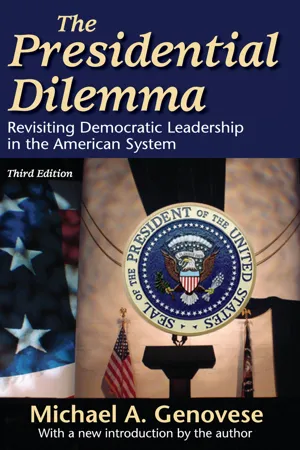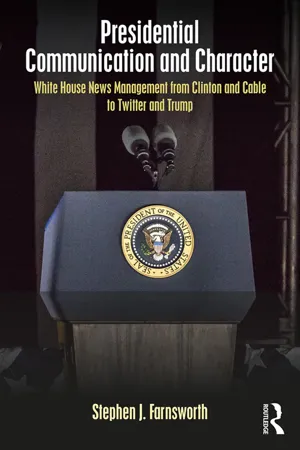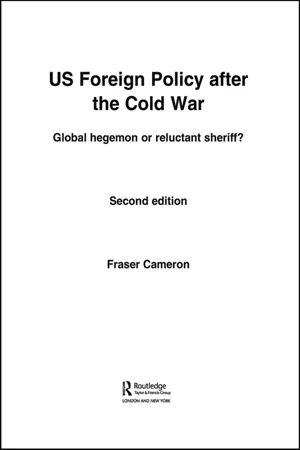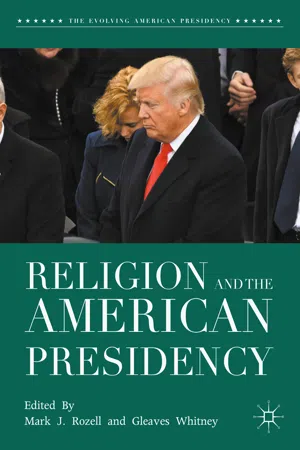Bill Clinton
Bill Clinton served as the 42nd President of the United States from 1993 to 2001. He is known for his centrist policies, presiding over a period of economic prosperity and signing the North American Free Trade Agreement (NAFTA). His presidency was also marked by controversies, including the Monica Lewinsky scandal, which led to his impeachment by the House of Representatives.
6 Key excerpts on "Bill Clinton"
- eBook - ePub
Unto a Good Land
A History of the American People, Volume 2: From 1865
- David Edwin Harrell, Edwin S. Gaustad, John B. Boles, Sally Foreman Griffith(Authors)
- 2005(Publication Date)
- Eerdmans(Publisher)
...Sporadic violence against Americans during the Clinton administration elicited limited responses. Then the dramatic terrorist attack of September 11, 2001, changed the course of modern history. George W. Bush launched a “war on terror” that led the United States ever more deeply into Middle Eastern politics and into military actions in Afghanistan and Iraq. These crises, and George W. Bush’s vigorous use of American military force in response to them, strained American relations with some old European allies, tested the post–Cold War friendship with Russia, and revealed how much Americans’ faith in the United Nations had frayed. Domestic politics during the Clinton and Bush administrations continued to wobble between left and right on such culture-war issues as abortion, affirmative action, and the environment. However, on critical economic issues, despite much partisan rhetoric, both presidents supported policies that expanded trade, limited government, and vigorously stimulated the economy. T HE C LINTON P RESIDENCY : T OWARD A C ENTRIST P OLICY Bill Clinton proved to be a consummate politician, as well as an effective trustee for the New Deal–Great Society commitment to social justice, whose job approval remained strong despite Republican control of Congress and a damaging investigation of his private life. Throughout his presidency, from 1993 to the beginning of 2001, he was the dominant personality in American public life. In character, Clinton appeared as an almost exact opposite of Ronald Reagan. Reagan had often seemed uninformed and unable to grasp the complexities of problems, but he exuded conviction and an unswerving loyalty to principles. Clinton was a complex, widely read, and talented man who often seemed unmoored to firm principles. Clinton demonstrated his political genius in his ability to position the Democratic Party near the political center...
- eBook - ePub
The Presidential Dilemma
Revisiting Democratic Leadership in the American System
- Michael A. Genovese(Author)
- 2017(Publication Date)
- Routledge(Publisher)
...The New York Times called it “Progressivism Light.” In foreign policy, while Clinton was not able to chart a clear course for the post-Cold War world, he did stem the dangerous tide of isolationism in the United States, kept the country at the center of global leadership, and made international free trade and economic growth benchmarks for his administration. Having taken the first difficult steps toward recognizing "globalism" as the wave of the future, he also expanded the definition of national security to include facing threats to free trade, cyber terrorism, and economic as well as environmental threats to security. Peace and prosperity were indeed impressive accomplishments during the Clinton era, and yet the gaping problems of character and the impeachment would always cast a dark shadow over his legacy. And while it may well be, as Clinton supporters hope, that history will regard the assault on his presidency in the same way most historians now regard the first presidential impeachment (overzealous Republicans were to blame!), Clinton can never escape the fact that he was impeached, a blemish that will hang over him forever. A man of enormous appetites and a few personal restraints, he demeaned himself and diminished the office. He pressed his legal claims in the Lewinsky affair to their legal limits and thereby left the presidency weaker and more defenseless. Presidential immunity, privilege, and privacy have all been eroded due to Clinton’s actions. In the long run, history will probably put Clinton somewhere in the middle of the pack of presidents. Not great, not a failure. His many political successes will salvage something, but his personal faults will haunt him. He is indeed a complex and contradictory man, and his presidency reflected all his grand complexity. He may have held the Republicans (Newt Gingrich) at bay, but he was hounded by personal failures...
- eBook - ePub
- Ellias Aghili Dehnavi, Mohammad Alizadeh Jamal(Authors)
- 2020(Publication Date)
- tredition(Publisher)
...10. Bill Clinton (January 20, 1993 - January 20, 2001) William Jefferson Bill Clinton was the 42nd President of the United States from 1993 to 2001. The end of the Cold War was an opportunity and also showed the existence of the global crisis for the United States; opportunity because it has expanded its influence scope, and the crisis because it has considered the collapse of the Soviet Union as an unjustified explanation for the need to expand interests. Considering that the US challenge in the transition period will be due to the distribution of general power rather than originated from the challenge of opponent's powers failed to provide a comprehensive strategy for US foreign policy that is inherently a three-step process by itself: determining the country's vital interests, identifying threats and the best way to use resources for profit (Christopher Layen, 1992: 564). The agreement on the issue that divergent forces in the world of politics leave no other way for the United States except to be involved (Richard N. Haass, 1997: 49-77) leads to provide a wide range of methods and strategies for foreign policy of the country. Convergence theorists, who consider competition a negligible issue and international institutions as the influential one in policy world, considered further commitment of the only superpower to international institutions (Richard Ullman, 1991: 76). Isolators have interpreted the strategic security of the United States as there is no need for its presence in all parts of the world and increase in domestic power to support this presence. (Dehshiar, 2005: 78) Some believe that the United States should devote its global power in the strategy of " Balancer away from the coast " or "prevention and deterrence." These strategies that diverge the United States from its security obligations out of the period, are focusing on the US domestic front (Eugene Gholz, 1997: 5-48)...
- eBook - ePub
Presidential Communication and Character
White House News Management from Clinton and Cable to Twitter and Trump
- Stephen J. Farnsworth(Author)
- 2018(Publication Date)
- Routledge(Publisher)
...As shown in Table 2.6, nearly three-quarters of those surveyed (74 percent) at the end of his second term said the scandals were most memorable part of the Clinton presidency. Clinton recorded the first balanced federal budget in decades, but only 14 percent said that the core of his legacy would be his economic policies. Foreign policy was even less relevant, with only 6 percent identifying any foreign policy initiative that rose above scandals as more memorable. Table 2.6 Public Views on Clinton’s Legacy, 2001 Thinking ahead, what do you think Bill Clinton will be most remembered for after he has left office? (Topics volunteered by respondent) 74% Scandals 14% Economy/Budget deficit 6% Foreign Policy 5% Other categories, positive comments 3% Other categories, negative comments 1% Domestic policy In the long run, do you think Bill Clinton will mostly be remembered for his accomplishments as president or for the impeachment and other scandals involving his administration? 28% Remembered for his accomplishments as president 67% Remembered for the impeachment and other scandals How do you think President Bill Clinton will go down in history … as an outstanding president, above average, average, below average, or poor? Clinton George H. W. Bush Reagan January 2001 January 1993 January 1989 Outstanding 12% 6% 17% Above Average 32% 30% 42% Average 32% 51% 25% Below Average 10% 8% 9% Poor 11% 4% 5% Note: Don’t Know responses are not reported here, so percentages do not sum to 100. Source: Pew 2001a. Overall, 44 percent of Americans said in that 2001 survey that Clinton would likely to be remembered as an above average or outstanding president. Eight years earlier, in contrast, 36 percent said that George H. W. Bush would be remembered as an above average or outstanding president...
- eBook - ePub
US Foreign Policy After the Cold War
Global Hegemon or Reluctant Sheriff?
- Fraser Cameron(Author)
- 2006(Publication Date)
- Routledge(Publisher)
...The efforts by Congress to cut or restrict US contributions to UN peacekeeping were also a direct response to the perceived failures in Somalia. Clinton could claim a number of other successes on the international economic front. Despite widespread unease in Congress and even within his administration, Clinton swiftly recognized the importance of helping Mexico when America’s neighbor faced a major financial crisis in 1994. As one writer put it, “Mexico was the test for what became the signature change in American foreign policy” (David Sanger, Washington Post, 28 December 2000). Apart from leading the rescue of Mexico after its financial crisis and securing passage of NAFTA through Congress, Clinton oversaw the completion of the Uruguay Round of trade negotiations, moved China closer toward membership of the World Trade Organization (WTO), negotiated new trade deals for African and Caribbean States, and supported debt relief for poor countries. Clinton’s supporters would also claim many other achievements for his presidency. On the European front, the President had upgraded relations with the EU, re-vitalized, adapted and expanded NATO, and led the alliance in military operations to end the killing in Bosnia and Kosovo. In Asia, the President had reduced the North Korean threat through a mixture of deterrence and diplomacy and helped bring China into the global mainstream. As regards Russia, Clinton had supported its transition to a market economy and its membership of the G8 and the Asia-Pacific Economic Cooperation forum (APEC), and helped it establish a new relationship with NATO. Clinton also helped secure the removal of nuclear weapons from Ukraine, Belarus, and Kazakhstan...
- eBook - ePub
- Mark J. Rozell, Gleaves Whitney, Mark J. Rozell, Gleaves Whitney(Authors)
- 2017(Publication Date)
- Palgrave Macmillan(Publisher)
...2000. The Postmodern Presidency: Bill Clinton’s Legacy in U.S. Politics. Pittsburgh: University of Pittsburgh Press. Sharman, J. Michael. 1995. Faith of the Fathers: Religion and Matters of Faith Contained in the Presidents’ Inaugural Addresses from George Washington to Bill Clinton. Culpeper, VA: Victory Publication. Silk, Mark. 1999. A Civil Religious Affair. The Leonard E. Greenberg Center for the Study of Religion in Public Life. Available from http://www.trincoll.edu/depts/csrpl/RINVol2No1/Civil_Religious.html (Accessed Sept 11, 2004). Stewart, James B. 1996. Blood Sport: The President and His Adversaries. New York: Simon & Schuster. Suskind, Ron. 2004. Without a Doubt. The New York Times. Available from http://www.nytimes.com/2004/10/17/magazine/17BUSH.html?ex=1099127648&ei=1&e (Accessed Oct 18, 2004). Thomas, Cal. 1998. Stopping Him before He Sins Again. Jewish World Review. Available from http://www.jewishworldreview.com/cols/thomas091898.asp (Accessed Sept 11, 2004). Walker, Martin. 1996. The President We Deserve: Bill Clinton, His Rise, Falls, and Comebacks, 1st ed. New York: Crown Publishers. Woodward, Bob. 1994. The Agenda: Inside the Clinton White House. New York: Simon & Schuster. ———. 1996. The Choice. New York: Simon & Schuster....





